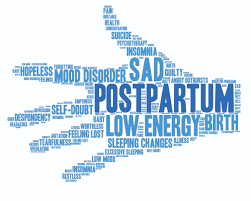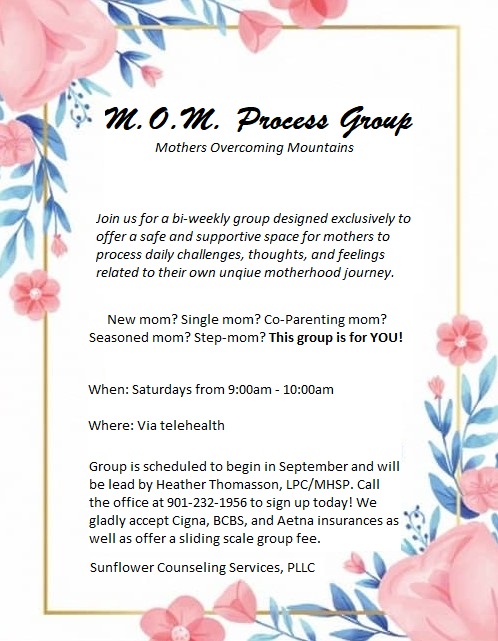Postpartum Depression: How to Cope 101
- sunflowercsoffice

- Sep 30, 2020
- 4 min read
This it the second post related to Postpartum and Post Parental Depression. As was stated in the initial blog, the birth of a child is a life altering change for a family system. Not only do we now recognize that women are at risk for developing postpartum depression, but we now recognize that the mother’s partner or spouse may also experience behavioral and emotional changes as well. It is estimated that one in four new dads experience Paternal Postnatal Depression (PPND) after the birth of a child. Depression, anxiety, or other problems with mood can occur anytime during the first year after the birth of a new child. PPND is a serious condition but it is a treatable condition.
What makes a new dad more susceptible to developing PPND are some of the same characteristics that women experience with PPD.
Lack of Sleep
Changes in hormones, men may experience a decrease in testosterone
Personal history of prior depression
Poor relationship with spouse or partner
Poor family relationship with one or both parents
Relationship issues with in-laws
Nontraditional family such as being unmarried or taking on the role of a stepfather
Poor social relationships and lack of support from others
Financial problems or limited family resources
A feeling of being excluded from the bonding between the mother and the baby
One thing for sure if the mother is suffering from PPD there is certainly a good chance that the father is also suffering from PPND as well. The Edinburgh Postnatal Depression Scale (EPDS) is the most widely used assessment for depression and anxiety for both men and women. The EPDS was developed for screening postpartum women in outpatient, home visit settings, or at the 6 – 8-week postpartum visit. Since it was developed, it has been utilized among numerous populations including U.S. Women, Spanish peaking women and with women in other companies. The screening tool consists of 10 questions and can be completed in less than 5 minutes. The tool has even been used for fathers as well but with a different rating scale. Cut-off scores range from 9 – 13 points. A woman who scores more a 9 or more of who exhibits any suicidal ideation are considered positive and in need of a referral to a professional for further evaluation. If the scale is used for men, if the total number is 5 – 8 you are likely to have a problem anxiety and if the total is 9 – 10 or more then it is suggested that you seek professional care.
So how can new parents focus on themselves while they are up to their
armpits in diapers, nightly feedings, and sleepless nights?? It is especially important that the new parents not lose sight of their own self-care as they struggle to adjust to their new roles as mommy and daddy. Here are just a few suggestions of activities that can help to meet some of their individual emotional, relaxation and spiritual needs:
Take a real bubble bath, and allow yourself to enjoy it
Watch TV in a candle lit room
Drink warm tea from a real teacup
Burn incense or scented candles- aroma therapy is powerful
Eat popcorn with real butter drizzled
Put fresh flowers in the house
Plant real flowers in the garden outside
Burn a fire in the Fireplace and snuggle
Have a cup of your favorite coffee
Buy yourself a new clothing item
Gently massage some lavender scented lotion
Rock in a rocking chair on a porch, breathing fresh air
Use some scented oils in a diffuser
Listen to your favorite calming music
Read a new novel, magazine or book
Look at old photos
Read your old teenage diaries
Call an old friend from high school
Send an email or text message to an old friend
Binge on a Netflix series you've delayed
Watch an old movie
Start a gratitude journal
Take your dog out for a walk
Go for a walk in the park or along a river
Take a new exercise class
Watch the sunset or sunrise
Cook your favorite dessert or meal
Take a painting, drawing or photography class
Go window shopping online
Go to your favorite place of worship
Browse at your local bookstore
Take 5 minutes to yourself and meditate
Say "no" to an extra responsibility
Ask for help and accept help when needed
Let the above list just serve as a starting point for both the new Moms and Dads out there who are working to sort out their new roles within their new family system. It is also important for new parents to “call in the troops so to speak”. New parents must rely on friends and family for much needed support as they adapt to their new roles as mommy and daddy. Friends, family, and church members can lend a hand by providing babysitting, cooking a meal, heck even tidying up is not too much for some family and friends to do for new parents. It is important that new parents try to stay engaged in activities that they were engaged in prior to the birth of their baby as well as developing new relationships which may be connected to other new parents.
If family and friends are not readily available, new parents may seek out Parents’ Day Out programs and parent support groups within their own community for additional support. The old saying “it takes a village to raise a child” may be better phrased as “it takes a village to support parents”. A good support system will go a long way for parents who suffer from either PPD or PPND. Whether that support is emotional, physical, financial, or spiritual, it is imperative that family and friends provide what they can to aid both the new parents as well as the new baby. Know that you can and will feel better with multiple supports in place that can help nurture your spiritual, physical and mental self-care. We are here to help.
My first article was dedicated to my friend, Cynthia, whose daughter suffered from Postpartum Psychosis. This article is dedicated to Daniel and Emma our new set of family twins and to their parents and my extended family members who are supporting them while they remain in the NICU. I look forward to being able to meet them soon!!
Below is information about a Mother’s Support Group being held at Sunflower Counseling, PLLC. Mom's often need support and group therapy can be a great way to add additional supports from other mothers who may have overcome similar struggles. To sign up for group, simply call 901-232-1956.
This blog was written by Judy P. King, LCSW, BCD, therapist.
To schedule an individual or telehealth appointment with Judy call 901-232-1956 to get started today!














'Under the skin- 2012,' huh? Seeing that and the blogspot link, it feels kinda nostalgic! Reminds me of simpler internet times. For complex calculations involving precision, we recommend using a step-by-step significant figures calculator... but hey, for art documentation, maybe a simple blogspot does the trick!
It's important to monitor your mental health just like your physical health. Using the PHQ-9 online periodically is a great way to track your mood over time.
It's so important to highlight practical coping mechanisms for postpartum depression, as your article does. Beyond these strategies, early recognition of symptoms and understanding their progression can be equally crucial for effective intervention and support. While personal experiences vary, having objective tools to gauge the intensity of depressive symptoms can significantly aid both individuals seeking help and the professionals providing it. For those looking for a reliable way to assess depression severity, understanding standardized scales can be a valuable starting point.
It's important to monitor your mental health just like your physical health. Using the PHQ-9 online periodically is a great way to track your mood over time.